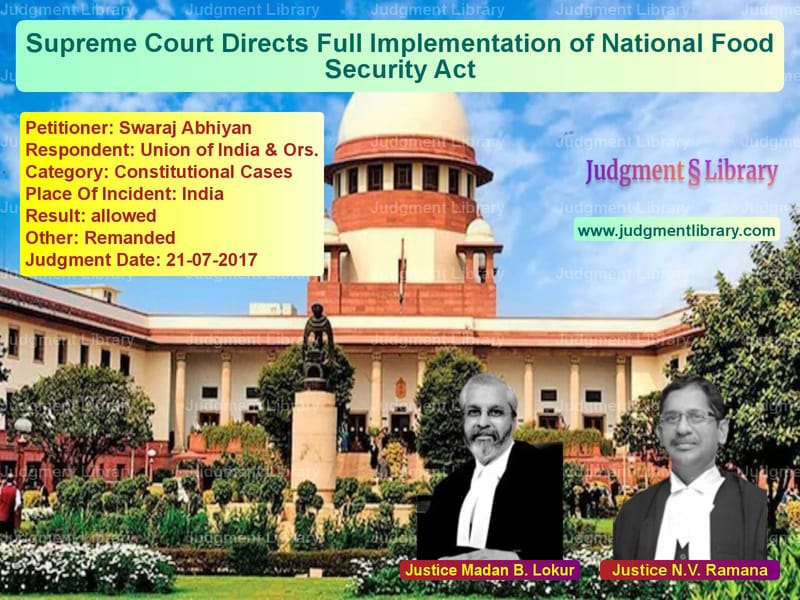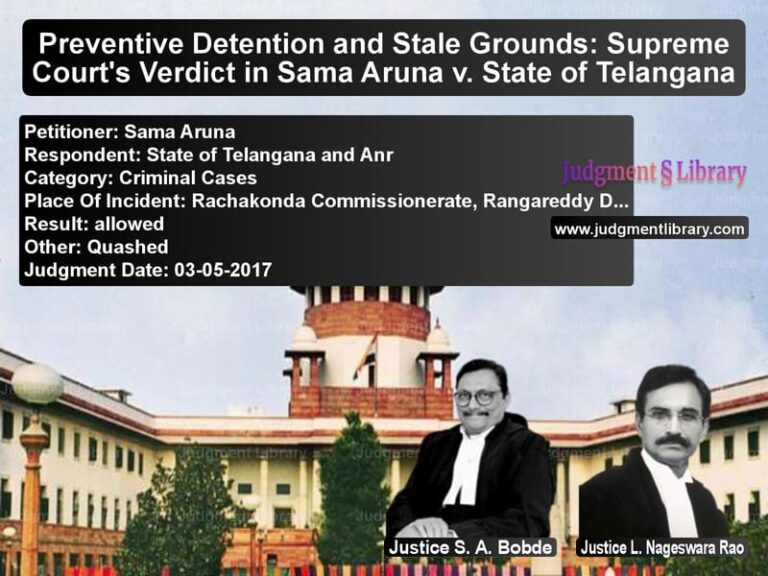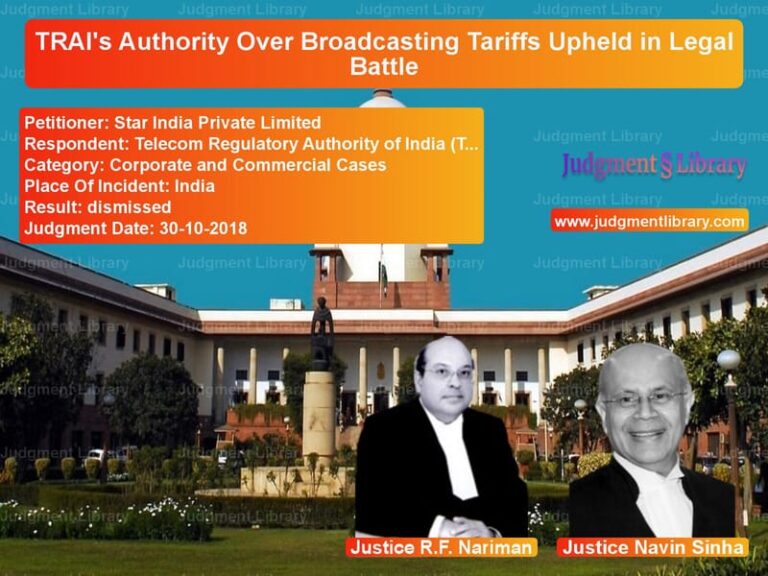Supreme Court Directs Full Implementation of National Food Security Act
The case of Swaraj Abhiyan vs. Union of India revolves around the delayed and improper implementation of the National Food Security Act, 2013 (NFS Act) by several state governments. The Supreme Court, in a significant ruling, directed the central government to ensure that all states comply with the provisions of the Act, emphasizing that food security is a fundamental right.
Background of the Case
The NFS Act was enacted to ensure access to adequate food at affordable prices for a significant portion of the Indian population. The Act mandates the establishment of grievance redressal mechanisms, State Food Commissions, and social audits. However, even after four years, several states had failed to implement these provisions fully.
The petitioner, Swaraj Abhiyan, approached the Supreme Court seeking enforcement of the Act, arguing that the delay in implementation was depriving millions of their legal entitlement to food security.
Key Issues in the Case
- Whether state governments were complying with the mandatory provisions of the NFS Act.
- Whether the central government had an obligation under Article 256 of the Constitution to direct states to implement the Act.
- What remedial measures should be taken to ensure full compliance?
Petitioner’s Arguments
Swaraj Abhiyan contended:
- The failure of states to establish grievance redressal mechanisms and State Food Commissions violated the legal rights of citizens.
- Section 14 of the NFS Act mandates states to put in place an internal grievance redressal mechanism, which many had failed to do.
- Section 15 of the Act requires the appointment of District Grievance Redressal Officers, but several states had either not appointed them or had given additional responsibilities to officers already managing the food distribution system, creating a conflict of interest.
- Section 16 mandates the constitution of State Food Commissions to monitor implementation, but many states had designated unrelated bodies, such as Consumer Disputes Redressal Commissions, to act as Food Commissions.
- Section 28 and Section 29 require social audits and vigilance committees to monitor the Targeted Public Distribution System (TPDS), but compliance was negligible.
- The central government was failing in its duty under Article 256 of the Constitution to ensure compliance with parliamentary laws.
Respondent’s (Union of India & States) Arguments
The central government argued:
- While some states had delayed implementation, the overall compliance rate was improving.
- The central government had issued repeated advisories to states, urging them to implement the provisions of the Act.
- It was ultimately the responsibility of state governments to ensure compliance, as food security is a state subject.
Supreme Court’s Analysis and Judgment
The Supreme Court, in a judgment authored by Justices Madan B. Lokur and N.V. Ramana, delivered a scathing critique of state governments for failing to implement a crucial welfare law. The Court directed the central government to take an active role in ensuring full compliance.
1. State Governments Cannot Ignore Parliamentary Laws
The Court emphasized that laws passed by Parliament cannot be rendered ineffective due to inaction by state governments:
“The Government of India cannot plead helplessness in requiring State Governments to implement parliamentary laws.”
2. Central Government’s Duty Under Article 256
The Court held that the central government had an obligation under Article 256 of the Constitution to ensure compliance with parliamentary laws:
“The executive power of every State shall be so exercised as to ensure compliance with the laws made by Parliament.”
3. Mandatory Constitution of State Food Commissions
The Court ruled that the State Food Commissions must be established in full compliance with Section 16 of the NFS Act:
“Some states have designated Consumer Commissions as Food Commissions. This is not in consonance with the provisions of the law, particularly the letter and spirit of the NFS Act.”
4. Appointment of Independent Grievance Redressal Officers
The Court found that several states had appointed officials already involved in food distribution as grievance officers, which was a clear conflict of interest:
“Designating an officer responsible for implementation as the grievance officer defeats the very purpose of grievance redressal.”
5. Implementation of Social Audits
The Court directed that states must conduct social audits as required under Section 28:
“The requirement of a social audit is undoubtedly salutary and must be implemented without delay.”
6. Setting Up Vigilance Committees
The Court ruled that states must establish vigilance committees to ensure accountability in the public distribution system:
“The absence of vigilance committees four years after the enactment of the law is a clear indication of administrative apathy.”
Final Orders
- The central government must convene meetings with state governments before August 31, 2017, to review implementation.
- All states must appoint independent grievance redressal officers within three months.
- State Food Commissions must be fully functional by the end of the year.
- Social audits must be conducted at least once every six months.
- Vigilance committees must be constituted and operational before the end of 2017.
Legal Implications
1. Strengthening the Right to Food
The ruling ensures that all states must implement food security measures, reinforcing the right to food as a legal entitlement.
2. Accountability in Welfare Laws
The judgment establishes that failure to implement welfare laws can lead to judicial intervention.
3. Central Government’s Role in Ensuring Compliance
The Court clarified that the central government cannot remain passive when states fail to implement national laws.
Conclusion
The Supreme Court’s ruling in Swaraj Abhiyan vs. Union of India is a landmark decision that reinforces the importance of food security laws in India. The judgment ensures that no state can neglect its duty to implement the NFS Act, thereby protecting the fundamental rights of millions of citizens. The Court’s directions provide a clear framework for immediate and effective implementation of the Act.
Don’t miss out on the full details! Download the complete judgment in PDF format below and gain valuable insights instantly!
Download Judgment: Swaraj Abhiyan vs Union of India & Ors Supreme Court of India Judgment Dated 21-07-2017.pdf
Direct Downlaod Judgment: Direct downlaod this Judgment
See all petitions in Fundamental Rights
See all petitions in Public Interest Litigation
See all petitions in Legislative Powers
See all petitions in Judgment by Madan B. Lokur
See all petitions in Judgment by N.V. Ramana
See all petitions in allowed
See all petitions in Remanded
See all petitions in supreme court of India judgments July 2017
See all petitions in 2017 judgments
See all posts in Constitutional Cases Category
See all allowed petitions in Constitutional Cases Category
See all Dismissed petitions in Constitutional Cases Category
See all partially allowed petitions in Constitutional Cases Category







